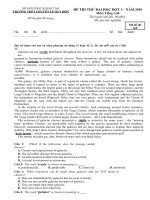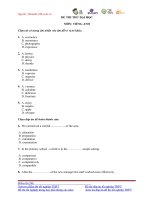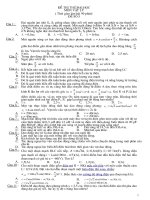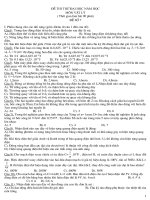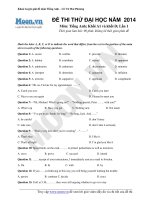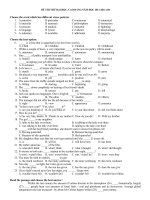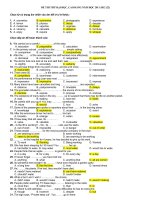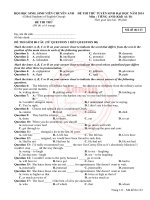De thi thu Dai hoc Mon Tieng Anh va dap an
Bạn đang xem bản rút gọn của tài liệu. Xem và tải ngay bản đầy đủ của tài liệu tại đây (120.83 KB, 6 trang )
<span class='text_page_counter'>(1)</span><div class='page_container' data-page=1>
<b> SỞ GD& ĐT NGHỆ AN</b>
<b>TRƯỜNG THPT NGUYỄN ĐỨC MẬU</b> KỲ THI THỬ ĐẠI HỌC
Năm học 2011- 2012
MÔN TIẾNG ANH, KHỐI D
<i> Thời gian làm bài: 90 phút</i>
<b>Mã đề: 145</b>
<i><b> Read the set of words given in italics, then mark the letter A, B, C or D on your answer sheet to </b></i>
<i><b>indicate the sentence that is the best made.</b></i>
<b> 1. </b><i>provide/ your handwriting/ legible/ test scorer/ accept/ your answer</i>
<b>A. Providing with your legible handwriting, every test scorer must accept your answer.</b>
<b>B.</b>Provided that your handwriting is legible, your answer will be accepted by any test scorer.
<b>C. Providing your handwriting is legible, the test scorer does not accept your answer.</b>
<b>D. Provided for your legible handwriting, the test scorer has to accept your answer.</b>
<b> 2.</b><i>New building / be / almost / twice / big / old one.</i>
<b>A. The new building is almost as twice big as the old one.</b>
<b>B.</b> A new building is almost twice as big as an old one.
<b>C.</b> The new building is almost twice big the old one.
<b>D.</b>The new building is almost twice as big as the old one.
<b> 3.</b><i>you/ really/ be/ able/ dress/ yourself/ age</i>.
<b>A.</b> You should really be able to dress yourself at your age
<b>B.</b> You are really able of dressing yourself this age!
<b>C.</b> You have really been able of dressing yourself by your age.
<b>D.</b> You must really be able of dressing yourself in your age.
<b> 4.</b><i>No one / know / answer / teacher / question.</i>
<b>A.</b> No one knows the answer of the teacher's question.
<b>B.</b> No one knows how to answer teacher's question
<b>C.</b>No one knows the answer to the teacher's question.
<b>D. No one knows to answer the teacher's question.</b>
<b> 5.</b><i>hilltop/ have/ good/ view/ our village</i>
<b>A. From the hilltop, our village can have a better view.</b>
<b>B. From the hilltop, our village can be well viewed.</b>
<b>C.</b>From the hilltop, we can have a better view of our village.
<b>D. The hilltop can make our village views better.</b>
Read the following passage and mark the letter A, B, C, or D on your answer sheet to indicate the
<i><b>correct answer to each of the questions from 6 to 15</b></i>
It takes a long time to raise a family of owlets, so the great horned owl begins early in the year. In
January and February, or as late as March in the North, the male calls to the female with a resonant hoot.
The female is larger than the male. She sometimes reaches a body length of twenty-two to twenty-four
inches, with a wingspread up to fifty inches. To impress her, the male does a strange courtship dance. He
bobs. He bows. He ruffles his feathers and hops around with an important air. He flutters from limb to limb
and makes flying sorties into the air. Sometimes he returns with an offering of food. They share the repast,
after which she joins the dance, hopping and bobbing about as though keeping time to the beat of an inner
drum.
Owls are poor home builders. They prefer to nest in a large hollow in a tree or even to occupy the
deserted nest of a hawk or crow. These structures are large and rough, built of sticks and bark and lined with
leaves and feathers. Sometimes owls nest on a rocky ledge, or even on the bare ground. even to occupy the
deserted nest of a hawk or crow. These structures are large and rough, built of sticks and bark and lined with
leaves and feathers. Sometimes owls nest on a rocky ledge, or even on the bare ground. The mother lays
two or three round, dull white eggs. Then she stoically settles herself on the nest and spreads her feather
skirts about her to protect her precious charges from snow and cold.
It is five weeks before the first downy white owlet pecks its way out of the shell. As the young birds feather
out, they look like wise old men with their wide eyes and quizzical expressions. They clamor for food and
keep the parents busy supplying mice, squirrels, rabbits, crayfish, and beetles. Later in the season baby
crows are taken. Migrating songsters, waterfowl, and game birds all fall prey to the hungry family. It is nearly
ten weeks before fledglings leave the nest to search for their own food. The parent birds weary of family life
by November and drive the young owls away to establish hunting ranges of their own.
<b> 6. </b><i>According to the passage, young owlets eat everything EXCEPT ____________</i>
</div>
<span class='text_page_counter'>(2)</span><div class='page_container' data-page=2>
<b> 7. </b><i>In line 2, the phrase </i><b>"a resonant hoot" </b><i> is closest in meaning to__________.</i>
<b>A. an instrument</b> <b>B. an offering of food</b> <b>C. a movement</b> <b>D.</b>a sound
<b> 8. </b><i>The phrase </i><b>"precious charges" </b><i>in lines 14 refers to ____________.</i>
<b>A.</b>the eggs <b>B. the nest</b> <b>C. other nesting owls</b> <b>D. the hawks and crows</b>
<b> 9. </b><i>What can be inferred from the passage about the adult parents of the young great horned owls?</i>
<b>A. They are sorry to see their young leave home.</b>
<b>B. They don't eat while they are feeding their young.</b>
<b>C. They probably don't see their young after November.</b>
<b>D. They are lazy and careless about feeding the small owlets.</b>
<b> 10. </b><i>In line 16, the word </i><b>"they" </b><i>refers to _______________.</i>
<b>A.</b>the young birds <b>B. the adult birds</b> <b>C. the wise old men</b> <b>D. the prey</b>
<b> 11.</b><i>The phrase </i><b>"weary of" </b><i>in line 19 is closest in meaning to________________.</i>
<b>A. are attracted to</b> <b>B. support</b> <b>C. become sad about</b> <b>D.</b>tire of
<b> 12.</b><i>According to the passage, great horned owls</i>
<b>A.</b>may inhabit a previously used nest <b>B.</b> build nests on tree limbs
<b>C.</b> need big nests for their numerous eggs <b>D.</b> are discriminate nest builders
<b> 13.</b><i>According to the passage, which of the following is the mother owl's job?</i>
<b>A.</b> To feed the young <b>B.</b>To sit on the nest
<b>C.</b> To build the nest <b>D.</b> To initiate the courtship ritual
<b> 14.</b><i>It can be inferred from the passage that the courtship of great horned owls ______.</i>
<b>A.</b> happens in the fall <b>B.</b> involves the male alone
<b>C.</b> takes place on the ground <b>D.</b>is an active process
<b> 15. </b><i>What is the topic of this passage?</i>
<b>A.</b> Mating rituals of great horned owls <b>B.</b> Raising a family of great horned owls
<b>C.</b> Nest building of great horned owls <b>D.</b> Habits of young great horned owls
<i><b>Mark the letter A, B, C, or D on your answer sheet to indicate the word that differs from the rest in the</b></i>
<i><b>position of the main stress in each of the following questions.</b></i>
<b> 16. A. picturesque</b> <b>B. photograph</b> <b>C. occupied</b> <b>D. campfire</b>
<b> 17. A. decision</b> <b>B. reference</b> <b>C. refusal</b> <b>D. important</b>
<b> 18. A. mountainous</b> <b>B. laborious</b> <b>C. vigorous</b> <b>D. dangerous</b>
<b> 19. A. portable</b> <b>B. computer</b> <b>C. literature</b> <b>D. temperature</b>
<b> 20. A. believe</b> <b>B. persuade</b> <b>C. anxious</b> <b>D. instead</b>
<b> Mark the letter A, B, C, or D on your answer sheet to show the underlined part that needs correction.</b>
<b>21. The rapid growth of the world's population over the past 100 years have led to a great increase in the </b>
A B C
acreage of land under cultivation .
D
<b> 22. Televisions are now an everyday feature of most households in the United States, and television </b>
A B C
viewing is the number one activity leisure .
D
<b>23. Bacteria are one of the most abund</b><i>an</i> t life forms on earth, growing on and inside another living things, in
A B C
every type of environment
D
<b> 24. In general, novels are thought of extended works of prose fiction depicting the inner and outer lives of </b>
A B C
their characters.
D
<b> 25. The flamingo constructs a cylindrical mud nest for its egg, which both parents care for it.</b>
A B C D
<i><b> Read the following passage adapted from A. Briggs’ article on culture, Microsoft® Student 2008, and </b></i>
<i><b>marks</b></i> <i><b>the letter A, B, C, or D on your answer sheet to indicate the correct answer to each of the </b></i>
<i><b>questions from 26 to 35.</b></i>
</div>
<span class='text_page_counter'>(3)</span><div class='page_container' data-page=3>
attributes, among them a knowledge of and interest in the arts, literature, and music. Yet the word culture does
not refer solely to such knowledge and interest nor, indeed, to education. At least from the 19th<sub> century</sub>
onwards, under the influence of anthropologists and sociologists, the word culture has come to be used
generally both in the singular and the plural (cultures) to refer to a whole way of life of people, including their
customs, laws, conventions, and values.
Distinctions have consequently been drawn between primitive and advanced culture and cultures, between
elite and popular culture, between popular and mass culture, and most recently between national and global
cultures. Distinctions have been drawn too between culture and civilization; the latter is a word derived not, like
culture or agriculture, from the soil, but from the city. The two words are sometimes treated as synonymous. Yet
this is misleading. While civilization and barbarism are pitted against each other in what seems to be a
perpetual behavioural pattern, the use of the word culture has been strongly influenced by conceptions of
evolution in the 19th<sub> century and of development in the 20</sub>th<sub> century. Cultures evolve or develop. They are not</sub>
static. They have twists and turns. Styles change. So do fashions. There are cultural processes. What, for
example, the word cultured means has changed substantially since the study of classical (that is, Greek and
Roman) literature, philosophy, and history ceased in the 20th<sub> century to be central to school and university</sub>
education. No single alternative focus emerged, although with computers has come electronic culture, affecting
kinds of study, and most recently digital culture. As cultures express themselves in new forms not everything
gets better or more civilized.
The multiplicity of meanings attached to the word made and will make it difficult to define. There is no single,
unproblematic definition, although many attempts have been made to establish one. The only non-problematic
definitions go back to agricultural meaning (for example, cereal culture or strawberry culture) and medical
meaning (for example, bacterial culture or penicillin culture). Since in anthropology and sociology we also
acknowledge culture clashes, culture shock, and counterculture, the range of reference is extremely wide.
<b> 26.</b> Which of the following is NOT stated in the passage?
<b>A.</b> The use of the word culture has been changed since the 19th<sub> century. </sub>
<b>B. Distinctions have been drawn between culture and civilization. </b>
<b>C.</b> Anthropology and sociology have tried to limit the references to culture.
<b>D. The word culture can be used to refer to a whole way of life of people. </b>
<b> 27. The author remarks that culture and civilization are the two words that ______. </b>
<b>A. have nearly the same meaning </b> <b>B. are both related to agriculture and cultivation </b>
<b>C. do not develop from the same meaning</b> <b>D. share the same word formation pattern </b>
<b> 28. The word "static" in paragraph 2 could best be replaced by "______". </b>
<b>A. regular</b> <b>B. unchanged</b> <b>C. dense</b> <b>D. balanced</b>
<b> 29. It is stated in paragraph 1 that a cultured person ______. </b>
<b>A. has a job related to cultivation </b> <b>B. does a job relevant to education</b>
<b>C. has knowledge of arts, literature, and music</b> <b>D. takes care of the soil and what grows on it</b>
<b> 30. The passage mainly discusses ______. </b>
<b>A. the multiplicity of meanings of the word culture</b> <b>B. the distinction between culture and civilization </b>
<b>C. the derivatives of the word culture</b> <b>D. the figurative meanings of the word culture</b>
<b> 31. The word "attributes" in paragraph 1 most likely means ______. </b>
<b>A. fields</b> <b>B. aspects</b> <b>C. skills</b> <b>D. qualities</b>
<b> 32. According to the passage, the word culture ______. </b>
<b>A. develops from Greek and Roman literature and history </b>
<b>B. comes from a source that has not been identified </b>
<b>C. derives from the same root as civilization does </b>
<b>D. is related to the preparation and use of land for farming</b>
<b> 33. It can be inferred from the passage that since the 20</b>th<sub> century ______. </sub>
<b>A. all schools and universities have taught classical literature, philosophy, and history </b>
<b>B. classical literature, philosophy, and history have been considered as core subjects </b>
<b>C. classical literature, philosophy, and history have not been taught as compulsory subjects</b>
<b>D. schools and universities have not taught classical literature, philosophy, and history </b>
<b> 34.</b> Which of the following is NOT true about the word culture?
<b>A. Its use has been considerably changed.</b> <b>B. It evolves from agriculture.</b>
<b>C.</b> It differs from the word civilization <b>D.</b> It is a word that cannot be defined.
<b> 35.</b> It is difficult to give the definitions of the word culture EXCEPT for its ______.
<b>A.</b> sociological and anthropological meanings <b>B.</b> agricultural and medical meanings
<b>C.</b> philosophical and historical meanings <b>D.</b> historical and figurative meanings
</div>
<span class='text_page_counter'>(4)</span><div class='page_container' data-page=4>
<b> 36. My cousin obviously didn't _________ much of an impression on you if you can't remember meeting </b>
her.
<b>A. create</b> <b>B. build</b> <b>C. do</b> <b>D. make</b>
<b> 37. The boy screamed for help but he couldn't _________.</b>
<b>A. hear him</b> <b>B. make himself heard</b> <b>C. make himself hear</b> <b>D. make him heard</b>
<b> 38. If you __________ to my advice in the first place, you wouldn't be in this mess now. </b>
<b>A. had listened</b> <b>B. will listen</b> <b>C. listened</b> <b>D. listen</b>
<b> 39. The government stopped the local companies from importing fake milk powder _________ of public </b>
health.
<b>A. for the attention</b> <b>B. on the safe side</b> <b>C. to the best</b> <b>D. in the interest</b>
<b> 40. ______ his good education, Taro knew little about Japan as he left Japan when he was very young.</b>
<b>A.</b> In stead of <b>B.</b> With all <b>C.</b> In place of <b>D.</b> Along with
<b> 41. ______ further rioting to occur, the government would be forced to use its emergency powers.</b>
<b>A.</b> Did <b>B.</b> Were <b>C.</b> Should <b>D.</b> Had
<b> 42.</b> - Peter: How are you today? - Susan: ____________
<b>A.</b> I feel like a million dollars. <b>B.</b> I feel like a million stars
<b>C.</b> I feel your ears burning<b>D.</b> I can feel it in my bone
<b> 43.</b> When you are learning a language at home, you can work at your own __________
<b>A.</b> speed <b>B.</b> way <b>C.</b> mind <b>D.</b> pace
<b> 44.</b> ________ in Paris before, he didn't know his way around when he took his family there.
<b>A.</b> Not be living <b>B.</b> Never having lived <b>C.</b> Because he has lived<b>D.</b> His not living
<b> 45.</b> - Henry: Well, it was nice talking to you, but I have to dash. - Liz: ____________
<b>A.</b> OK, see you. <b>B.</b> Yes, I enjoyed talking to you, too
<b>C.</b> Thanks! I will stop now.<b>D.</b> Yes, It was.
<b> 46.</b> Wasn't it you __________ the door open?
<b>A. to leave</b> <b>B. to have left</b> <b>C. that should left</b> <b>D. who left</b>
<b> 47.</b> I hear that miniskirts are coming back into fashion. I wonder if they'll really ____ again.
<b>A. catch on</b> <b>B. catch out</b> <b>C. catch hold</b> <b>D. catch up</b>
<b> 48. As children, we were very poor. When my father finally became rich, he told us that he wanted to </b>
________ all the hardships we had suffere
<b>A. make over to</b> <b>B. make up for</b> <b>C. make out with</b> <b>D. make off with</b>
<b> 49. The candidates' experience and qualifications will be taken into ______ when the decision is made.</b>
<b>A. consideration</b> <b>B. opinions</b> <b>C. thoughts</b> <b>D. review</b>
<b> 50. One can't help _____ compassion for the people who lost their homes in the earthquake.</b>
<b>A. from feeling</b> <b>B. but feel</b> <b>C. in feeling</b> <b>D. to feel</b>
<b> 51. - John: Who do you think will win this beauty contest? - David: ____________</b>
<b>A. No idea</b> <b>B. It doesn't matter</b>
<b>C. It's not important</b> <b>D. I really couldn't say, I'm afraid </b>
<b> 52. Your house looks so new and strange, doesn't it? - Well, _________.</b>
<b>A. it's been painted</b> <b>B. it was painted recently C. it's painted</b> <b>D. it's being painted</b>
<b> 53. __________ , the people who come to this club in their twenties and thirties .</b>
<b>A. To a degree</b> <b>B. Altogether</b> <b>C. Virtually</b> <b>D. By and large</b>
<b> 54. She really ________ reading intelligent books.</b>
<b>A. make up of</b> <b>B. go in for</b> <b>C. catch up on</b> <b>D. bring in</b>
<b> 55. I would appreciate __________ it a secret.</b>
<b>A. that you keep</b> <b>B. your keeping</b> <b>C. you to keep</b> <b>D. that you will keep</b>
<b> 56. - Margaret: He won the race? That's impossible. - Paul: ____________</b>
<b>A. I couldn't say.</b> <b>B. Yes, it is.</b> <b>C. So you say.</b> <b>D. No, it is.</b>
<b> 57. __________, let me know.</b>
<b>A. Should you hear anything</b> <b>B. If you heard anything</b>
<b>C. Had you heard anything</b> <b>D. Unless you hear anything</b>
<b> 58.</b> Improving the overall environmental quality is a long-term battle in which we do want the participation of
everyone in society in order to ________ results.
<b>A.</b> reap <b>B.</b> bear <b>C.</b> generate <b>D.</b> realize
<b> 59.</b> ________ global solidarity, the world would not be better prepared for the influenza H1N1 pandemic
<b>A.</b> But for <b>B.</b> On account of <b>C.</b> Thanks to <b>D.</b> If not
<b> 60.</b> Carbon emissions from airplanes and other pollutants ________to global warming.
<b>A.</b> spark <b>B.</b> attribute <b>C.</b> contribute <b>D.</b> stem
<b> 61.</b> __________ I know the money is safe, I shall not worry about it.
<b>A.</b> Even though <b>B.</b> Unless <b>C.</b> However <b>D.</b> As long as
</div>
<span class='text_page_counter'>(5)</span><div class='page_container' data-page=5>
<b>A. his knocking on our door was ignored by us</b> <b>B. ignored him knocking on our door</b>
<b>C. ignored him knocking with our door</b> <b>D. ignored his knocking on our door</b>
<b> 63. Making mistakes is all __________ of growing up.</b>
<b>A. part and parcel</b> <b>B. odds and ends</b> <b>C. top and bottom</b> <b>D. chalk and cheese</b>
<b> 64. Parents play a ________ role in a child's upbringing in the formative years. They are really the driving </b>
force behind whatever the children do.
<b>A. title</b> <b>B. supporting</b> <b>C. starring</b> <b>D. crucial</b>
<b> 65. - Jennifer: -What are you doing ? - Alan: ____________</b>
<b>A. Look after your own affairs.</b> <b>B. You don't enter at all. </b>
<b>C. It's none of your business.</b> <b>D. It doesn't touch you.</b>
<i><b>Read the following passage and mark the letter A, B, C, or D on your answer sheet to indicate the </b></i>
<i><b>correct word for each of the blanks from 66 to 75</b></i>
<i><b> The Industrial Revolution in Britain was built on the use of machines in factories. Since the s, Britain's </b></i>
(66)_______ industries have replaced machine operators with computers, and this (67)_______ has led to
a decline in the number of (68)_______ in many factories. Goods are bought and used much more than
ever before but a lot of these goods are importe By the beginning of the th century, other industrial countries
like the USA were (69)_______ with Britain's exports, and countries in the Far East have been able to
provide cheaper (70)_______ since the s. Areas located with heavy industries are suffering high
unemployment. During the last years, there has been a constant rise in smaller industries (71)_______ as
"light industries". These ones use electricity and are not (72)_______ on raw materials such as coal so they
are "footloose", i.e. they can be located anywhere. They produce such things as washing machines or spare
(73)_______ . Some of these industries produce nothing at all, but provide services like distribution. The
consumer boom of the s and the increased leisure time of most Britons have led to rapid (74)_______ in
service industries like banking, tourism, retailing and information processing, and in industries which
distribute, maintain, and repair (75)_______ consumer goods.
<b> 66. A. manufacturing</b> <b>B. running</b> <b>C. large</b> <b>D. big</b>
<b> 67. A. automation</b> <b>B. change</b> <b>C. replacement</b> <b>D. exchange</b>
<b> 68. A. employers</b> <b>B. servers</b> <b>C. labours</b> <b>D. employees</b>
<b> 69. A. working</b> <b>B. familiar</b> <b>C. competing</b> <b>D. fed up</b>
<b> 70. A. products</b> <b>B. things</b> <b>C. imports</b> <b>D. produce</b>
<b> 71.</b> <b>A.</b> worked <b>B.</b> considered <b>C.</b> known <b>D.</b> regarded
<b> 72. A. dependent</b> <b>B. command</b> <b>C. dependable</b> <b>D. reliable</b>
<b> 73.</b> <b>A.</b> details <b>B.</b> parts <b>C.</b> sections <b>D.</b> gadgets
<b> 74.</b> <b>A.</b> extension <b>B.</b> expansion <b>C.</b> growth <b>D.</b> increase
<b> 75.</b> <b>A.</b> everyday <b>B.</b> household <b>C.</b> expensive <b>D.</b> home
Mark the letter A, B, C or D on your answer sheet to indicate the sentence which is closest in
<i><b>meaning to each of the following questions.</b></i>
<b> 76.</b><i>You should have persuaded him to change his mind.</i>
<b>A.</b> You should persuade him to change his mind.
<b>B.</b> You persuaded him to change his mind but he didn't listen.
<b>C.</b>It was essential to persuade him to change his mind but you didn't.
<b>D.</b> You didn't persuade him to change because of his mind
<b> 77.</b><i>Linda seems to have very little regard for other people's feelings.</i>
<b>A. Linda doesn't respect people who feel sorry for themselves.</b>
<b>B.</b> Linda has difficulty expressing her feelings for other people.
<b>C. Linda has very few feelings like other people's.</b>
<b>D.</b>Linda appears unconcerned about other people's feelings
<b> 78. </b><i>He likes nothing better than fishing on a hot, summer day.</i>
<b>A. He loves nothing, even fishing on a hot, summer day.</b>
<b>B.</b>Fishing is his favourite enjoyment on a hot, summer day
<b>C. He doesn't like fishing on a hot, summer day.</b>
<b>D. Although he likes fishing, he doesn't want to do it on a hot, summer day.</b>
<b> 79. </b><i>"If you don't apologise immediately, I'm leaving," she told him.</i>
<b>A. She told him not to apologise immediately.</b>
<b>B. She asked him to apologise immediately because she was leaving.</b>
<b>C.</b>She threatened to leave unless he apologised immediately.
<b>D. She told him she was leaving if he apologised immediately.</b>
<b> 80. </b><i>"Cigarette?" he asked<b>. </b>"No, thanks." I said.</i>
</div>
<span class='text_page_counter'>(6)</span><div class='page_container' data-page=6>
<b>B. He mentioned a cigarette, so I thanked him.</b>
<b>C.</b>He offered me a cigarette, so I promptly declined.
<b>D. He asked for a cigarette, and I immediately refused.</b>
<b>KEY</b>
<b>1B</b> <b>2D</b> <b>3A</b> <b>4C</b> <b>5C</b> <b>6D</b> <b>7D</b> <b>8A</b> <b>9C</b> <b>10A</b>
<b>11D</b> <b>12A</b> <b>13B</b> <b>14D</b> <b>15B</b> <b>16A</b> <b>17B</b> <b>18B</b> <b>19B</b> <b>20C</b>
<b>21A</b> <b>22D</b> <b>23C</b> <b>24A</b> <b>25D</b> <b>26C</b> <b>27C</b> <b>28B</b> <b>29C</b> <b>30A</b>
<b>31D</b> <b>32D</b> <b>33C</b> <b>34D</b> <b>35B</b> <b>36D</b> <b>37B</b> <b>38A</b> <b>39D</b> <b>40B</b>
<b>41B</b> <b>42A</b> <b>43D</b> <b>44B</b> <b>45A</b> <b>46D</b> <b>47A</b> <b>48B</b> <b>49A</b> <b>50B</b>
<b>51D</b> <b>52A</b> <b>53D</b> <b>54B</b> <b>55B</b> <b>56C</b> <b>57A</b> <b>58D</b> <b>59A</b> <b>60C</b>
<b>61D</b> <b>62D</b> <b>63A</b> <b>64D</b> <b>65C</b> <b>66A</b> <b>67A</b> <b>68D</b> <b>69C</b> <b>70A</b>
<b>71C</b> <b>72A</b> <b>73B</b> <b>74C</b> <b>75B</b> <b>76C</b> <b>77D</b> <b>78B</b> <b>79C</b> <b>80C</b>
</div>
<!--links-->

